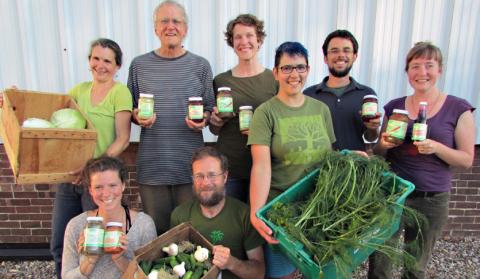
Excerpted from The Democracy Collaborative report, Strategies for Financing the Inclusive Economy, originally published September 2016. (Photo: Real Pickles)
Real Pickles sold its first jar of organic dills in 2001, when founders Dan Rosenberg and his wife, Addie Rose Holland, decided to turn their pickle-making hobby into a business. It has grown to more than $1 million in revenue in 2015, earning $125,000 in net income. How workers bought this business from the founders, using the innovative model of a direct public offering, offers lessons in grassroots financing for worker ownership.
In 2012, the co-founders and staff members formed a new worker cooperative to purchase the business. The five worker-owners each purchased a $6,000 membership share, a price determined based on worker affordability. The workers then faced the hurdle of raising more than $500,000 to buy the business and have operating capital.
Preferred stock was considered the most viable option. The aim is to pay investors a 4 to 5 percent annual dividend; this was deemed more workable than the 8 to 12 percent interest on a subordinated loan, or the 15 percent annual return needed for a royalty arrangement (in which royalties are a percent of profits). Real Pickles added the innovation of selling preferred shares through a direct public offering (DPO).
A DPO is similar to an initial public offering (IPO), in that the business can advertise the offering openly and can accept non-wealthy investors; yet a DPO costs substantially less in legal fees, raises only up to $1 million, and is targeted at stakeholders, such as customers and neighbors. Real Pickles was assisted by Cutting Edge Capital, which has helped more than 60 clients launch DPOs.
Financing the Worker Buyout of Real Pickles

Real Pickles set the minimum investment at $2,500. This was a "key decision," Rosenberg has said. "It was a figure low enough to allow for relatively broad participation, while high enough to keep our investment pool a manageable size." Shares are non-transferable except to the coop, and they include a 4 percent dividend target when the board decides to distribute dividends. Shares must be held for at least five years to be sold back at the same price for which they were purchased.
Real Pickles sold $500,000 in shares to 77 investors; some used their self-directed individual retirement accounts. Institutional investors included consumer co-ops that purchase from Real Pickles, other wholesale customers, one supplier, a foundation, and a CDFI. The company planned a six-month campaign, but the shares sold out in two months. Workers completed the purchase of the business in May 2013.
